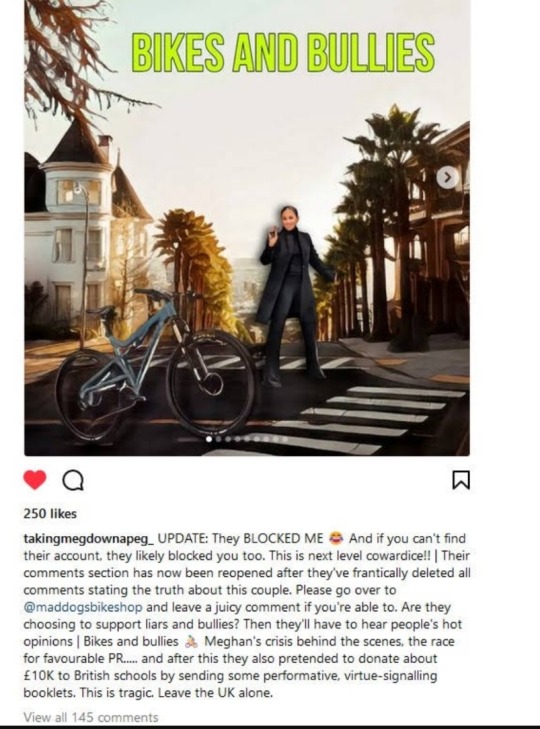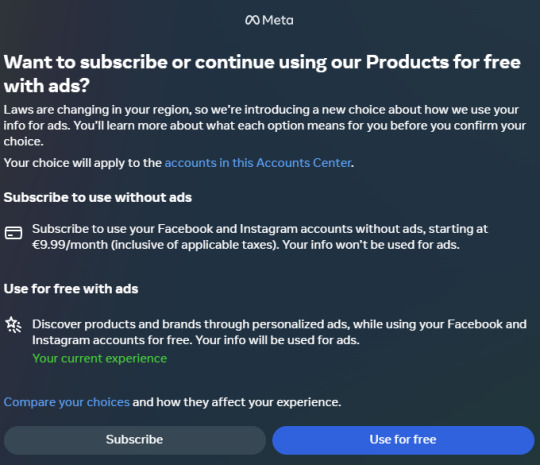#Privacy Pays
Text
A 12-MONTH RECONCILLIATION & OTHER SUBJECTS
When Harry and Meghan decided to "step back" as "senior working royals" in January 2020, it was agreed by HM Queen Elizabeth II and the then Prince of Wales, HRH Prince Charles and HRH Prince William that a 12 month review of this decision would take place in January 2021. The fact Our Lady of Perpetual Victimhood is letting it be known in the press and popular media that the Sussex family is willing to reconcile with the rest of the family following the death of Her Majesty, but giving it a time scale of 12 months is testament to her pettiness. Not for her a press release saying "times like this make you realise how important family is..."
Her shallow, peevish, point-scoring, one-upmanship, mentality practically screams out for satisfaction, for revenge. This is why the Montecito Moanarchy has put a 12 month timescale on the reconciliation.
Harry, his memoir and Netflix. Poor old Harry, hey. What's a poor, misunderstood, downtrodden, hounded Princeling to do? Fed up with life in the goldfish bowl/Truman Show world that is the British Royal Family, he ups sticks with his wife and baby son, and, with the blessings of his family flees to that well known bastion of privacy and solitude, California.
Yes, after a decade spent playing call of duty doing his duty as a serving soldier in HM's army, followed by a stint as the 3rd wheel to the Prince and Princess of Wales, Saint Henry of the Wounded Ego, fed up to the back teeth of the constant hounding of the press and paparazzi of himself and his beleaguered girlfriend/wife made the very wise and impossibly grown-up decision to do what she tells him and they returned to her home state. They wanted to get away from all the intrusions and as Meghan said, they don't have tabloids where she comes from!
So, Harry wanted his privacy, as did Meghan. On their terms. This is the story of their lives. Everything has to be on their terms. Meghan has no problem giving interviews to Oprah, Ellen and now it seems every cut-rate gossip mag masquerading as serious journalism. Harry is willing to invade his own privacy as long as the price is right. Worse, if the price is better than he was expecting, he is quite happy to invade the privacy of the family he left behind in the UK.
His paymasters at Netflix and Penguin Random House have shelled out multi-million $$$ for the inside stories of the "Standing Out With the Sussexes" and "Harry Windsor - How I went From Spare to Hero to Handbag" and they want their pound of flesh. As we've seen, Harry is learning self-promotion well, people are already talking about the book, it's being insinuated that a chapter here and there is being either heavily edited/rewritten or even taken out and allusions are being made to the affair that never was between William and Rose Hanbury. Simply by doing that, he's garnered interest for the book and conversely for the series.
Another year, another paid for "humanitarian" award? Meghan's jealousy really does know no bounds does it?
On the anniversary of the moon landing, 20 July 2022, Boston was announced as the host city for this year's Earthshot Awards. Inspired by President John F. Kennedy's "moonshot" challenge, it seems fitting to have the second award here in his home city. Working with The John F. Kennedy Library Foundation and the city of Boston, the awards will be broadcast to a global audience. Ambassador Caroline Kennedy (JFK's daughter) said, " “There is no more important Moonshot today than repairing the planet and no better place to harness the Moonshot spirit than the City of Boston.”
Which brings us back to Meghan because of course it does. It always does. Suddenly a few days ago, along with President Zelensky of Ukraine, the Duke and Duchess of Sussex were late announcements for the Robert F. Kennedy "Ripple of Hope" awards 2022. See? William is parterning with the Kennedys, America's answer to the royal family? Well, gosh, darn it! Meghan and Harry are going to do something with the Kennedy's too. So there!
Now, I'm not saying they paid for this award. I'm not 100% certain they could afford to pay for a table looking at the prices if the rumours of their financial situation is to be believed but, I'm also not not saying they paid for this award. They have a track record so, make of it what you will. Click on the photos of the other recipients and you get a short bio of who they are and the work they do (why they're getting the award). Click on the photo of the duplicitous duo and you get the photo credit. And yet, according to Kerry Kennedy, daughter of Robert F. Kennedy, the pair were made aware they had been awarded the prize back in March. To me, that speaks volumes.
#Our Lady of Perpetual Victimhood#Saint Henry of the Wounded Ego#Privacy Pays#Will Sell Out Family For $$$#You get a Kennedy I get a Kennedy
47 notes
·
View notes
Text
Your car spies on you and rats you out to insurance companies

I'm on tour with my new, nationally bestselling novel The Bezzle! Catch me TOMORROW (Mar 13) in SAN FRANCISCO with ROBIN SLOAN, then Toronto, NYC, Anaheim, and more!

Another characteristically brilliant Kashmir Hill story for The New York Times reveals another characteristically terrible fact about modern life: your car secretly records fine-grained telemetry about your driving and sells it to data-brokers, who sell it to insurers, who use it as a pretext to gouge you on premiums:
https://www.nytimes.com/2024/03/11/technology/carmakers-driver-tracking-insurance.html
Almost every car manufacturer does this: Hyundai, Nissan, Ford, Chrysler, etc etc:
https://www.repairerdrivennews.com/2020/09/09/ford-state-farm-ford-metromile-honda-verisk-among-insurer-oem-telematics-connections/
This is true whether you own or lease the car, and it's separate from the "black box" your insurer might have offered to you in exchange for a discount on your premiums. In other words, even if you say no to the insurer's carrot – a surveillance-based discount – they've got a stick in reserve: buying your nonconsensually harvested data on the open market.
I've always hated that saying, "If you're not paying for the product, you're the product," the reason being that it posits decent treatment as a customer reward program, like the little ramekin warm nuts first class passengers get before takeoff. Companies don't treat you well when you pay them. Companies treat you well when they fear the consequences of treating you badly.
Take Apple. The company offers Ios users a one-tap opt-out from commercial surveillance, and more than 96% of users opted out. Presumably, the other 4% were either confused or on Facebook's payroll. Apple – and its army of cultists – insist that this proves that our world's woes can be traced to cheapskate "consumers" who expected to get something for nothing by using advertising-supported products.
But here's the kicker: right after Apple blocked all its rivals from spying on its customers, it began secretly spying on those customers! Apple has a rival surveillance ad network, and even if you opt out of commercial surveillance on your Iphone, Apple still secretly spies on you and uses the data to target you for ads:
https://pluralistic.net/2022/11/14/luxury-surveillance/#liar-liar
Even if you're paying for the product, you're still the product – provided the company can get away with treating you as the product. Apple can absolutely get away with treating you as the product, because it lacks the historical constraints that prevented Apple – and other companies – from treating you as the product.
As I described in my McLuhan lecture on enshittification, tech firms can be constrained by four forces:
I. Competition
II. Regulation
III. Self-help
IV. Labor
https://pluralistic.net/2024/01/30/go-nuts-meine-kerle/#ich-bin-ein-bratapfel
When companies have real competitors – when a sector is composed of dozens or hundreds of roughly evenly matched firms – they have to worry that a maltreated customer might move to a rival. 40 years of antitrust neglect means that corporations were able to buy their way to dominance with predatory mergers and pricing, producing today's inbred, Habsburg capitalism. Apple and Google are a mobile duopoly, Google is a search monopoly, etc. It's not just tech! Every sector looks like this:
https://www.openmarketsinstitute.org/learn/monopoly-by-the-numbers
Eliminating competition doesn't just deprive customers of alternatives, it also empowers corporations. Liberated from "wasteful competition," companies in concentrated industries can extract massive profits. Think of how both Apple and Google have "competitively" arrived at the same 30% app tax on app sales and transactions, a rate that's more than 1,000% higher than the transaction fees extracted by the (bloated, price-gouging) credit-card sector:
https://pluralistic.net/2023/06/07/curatorial-vig/#app-tax
But cartels' power goes beyond the size of their warchest. The real source of a cartel's power is the ease with which a small number of companies can arrive at – and stick to – a common lobbying position. That's where "regulatory capture" comes in: the mobile duopoly has an easier time of capturing its regulators because two companies have an easy time agreeing on how to spend their app-tax billions:
https://pluralistic.net/2022/06/05/regulatory-capture/
Apple – and Google, and Facebook, and your car company – can violate your privacy because they aren't constrained regulation, just as Uber can violate its drivers' labor rights and Amazon can violate your consumer rights. The tech cartels have captured their regulators and convinced them that the law doesn't apply if it's being broken via an app:
https://pluralistic.net/2023/04/18/cursed-are-the-sausagemakers/#how-the-parties-get-to-yes
In other words, Apple can spy on you because it's allowed to spy on you. America's last consumer privacy law was passed in 1988, and it bans video-store clerks from leaking your VHS rental history. Congress has taken no action on consumer privacy since the Reagan years:
https://www.eff.org/tags/video-privacy-protection-act
But tech has some special enshittification-resistant characteristics. The most important of these is interoperability: the fact that computers are universal digital machines that can run any program. HP can design a printer that rejects third-party ink and charge $10,000/gallon for its own colored water, but someone else can write a program that lets you jailbreak your printer so that it accepts any ink cartridge:
https://www.eff.org/deeplinks/2020/11/ink-stained-wretches-battle-soul-digital-freedom-taking-place-inside-your-printer
Tech companies that contemplated enshittifying their products always had to watch over their shoulders for a rival that might offer a disenshittification tool and use that as a wedge between the company and its customers. If you make your website's ads 20% more obnoxious in anticipation of a 2% increase in gross margins, you have to consider the possibility that 40% of your users will google "how do I block ads?" Because the revenue from a user who blocks ads doesn't stay at 100% of the current levels – it drops to zero, forever (no user ever googles "how do I stop blocking ads?").
The majority of web users are running an ad-blocker:
https://doc.searls.com/2023/11/11/how-is-the-worlds-biggest-boycott-doing/
Web operators made them an offer ("free website in exchange for unlimited surveillance and unfettered intrusions") and they made a counteroffer ("how about 'nah'?"):
https://www.eff.org/deeplinks/2019/07/adblocking-how-about-nah
Here's the thing: reverse-engineering an app – or any other IP-encumbered technology – is a legal minefield. Just decompiling an app exposes you to felony prosecution: a five year sentence and a $500k fine for violating Section 1201 of the DMCA. But it's not just the DMCA – modern products are surrounded with high-tech tripwires that allow companies to invoke IP law to prevent competitors from augmenting, recongifuring or adapting their products. When a business says it has "IP," it means that it has arranged its legal affairs to allow it to invoke the power of the state to control its customers, critics and competitors:
https://locusmag.com/2020/09/cory-doctorow-ip/
An "app" is just a web-page skinned in enough IP to make it a crime to add an ad-blocker to it. This is what Jay Freeman calls "felony contempt of business model" and it's everywhere. When companies don't have to worry about users deploying self-help measures to disenshittify their products, they are freed from the constraint that prevents them indulging the impulse to shift value from their customers to themselves.
Apple owes its existence to interoperability – its ability to clone Microsoft Office's file formats for Pages, Numbers and Keynote, which saved the company in the early 2000s – and ever since, it has devoted its existence to making sure no one ever does to Apple what Apple did to Microsoft:
https://www.eff.org/deeplinks/2019/06/adversarial-interoperability-reviving-elegant-weapon-more-civilized-age-slay
Regulatory capture cuts both ways: it's not just about powerful corporations being free to flout the law, it's also about their ability to enlist the law to punish competitors that might constrain their plans for exploiting their workers, customers, suppliers or other stakeholders.
The final historical constraint on tech companies was their own workers. Tech has very low union-density, but that's in part because individual tech workers enjoyed so much bargaining power due to their scarcity. This is why their bosses pampered them with whimsical campuses filled with gourmet cafeterias, fancy gyms and free massages: it allowed tech companies to convince tech workers to work like government mules by flattering them that they were partners on a mission to bring the world to its digital future:
https://pluralistic.net/2023/09/10/the-proletarianization-of-tech-workers/
For tech bosses, this gambit worked well, but failed badly. On the one hand, they were able to get otherwise powerful workers to consent to being "extremely hardcore" by invoking Fobazi Ettarh's spirit of "vocational awe":
https://www.inthelibrarywiththeleadpipe.org/2018/vocational-awe/
On the other hand, when you motivate your workers by appealing to their sense of mission, the downside is that they feel a sense of mission. That means that when you demand that a tech worker enshittifies something they missed their mother's funeral to deliver, they will experience a profound sense of moral injury and refuse, and that worker's bargaining power means that they can make it stick.
Or at least, it did. In this era of mass tech layoffs, when Google can fire 12,000 workers after a $80b stock buyback that would have paid their wages for the next 27 years, tech workers are learning that the answer to "I won't do this and you can't make me" is "don't let the door hit you in the ass on the way out" (AKA "sharpen your blades boys"):
https://techcrunch.com/2022/09/29/elon-musk-texts-discovery-twitter/
With competition, regulation, self-help and labor cleared away, tech firms – and firms that have wrapped their products around the pluripotently malleable core of digital tech, including automotive makers – are no longer constrained from enshittifying their products.
And that's why your car manufacturer has chosen to spy on you and sell your private information to data-brokers and anyone else who wants it. Not because you didn't pay for the product, so you're the product. It's because they can get away with it.
Cars are enshittified. The dozens of chips that auto makers have shoveled into their car design are only incidentally related to delivering a better product. The primary use for those chips is autoenshittification – access to legal strictures ("IP") that allows them to block modifications and repairs that would interfere with the unfettered abuse of their own customers:
https://pluralistic.net/2023/07/24/rent-to-pwn/#kitt-is-a-demon
The fact that it's a felony to reverse-engineer and modify a car's software opens the floodgates to all kinds of shitty scams. Remember when Bay Staters were voting on a ballot measure to impose right-to-repair obligations on automakers in Massachusetts? The only reason they needed to have the law intervene to make right-to-repair viable is that Big Car has figured out that if it encrypts its diagnostic messages, it can felonize third-party diagnosis of a car, because decrypting the messages violates the DMCA:
https://www.eff.org/deeplinks/2013/11/drm-cars-will-drive-consumers-crazy
Big Car figured out that VIN locking – DRM for engine components and subassemblies – can felonize the production and the installation of third-party spare parts:
https://pluralistic.net/2022/05/08/about-those-kill-switched-ukrainian-tractors/
The fact that you can't legally modify your car means that automakers can go back to their pre-2008 ways, when they transformed themselves into unregulated banks that incidentally manufactured the cars they sold subprime loans for. Subprime auto loans – over $1t worth! – absolutely relies on the fact that borrowers' cars can be remotely controlled by lenders. Miss a payment and your car's stereo turns itself on and blares threatening messages at top volume, which you can't turn off. Break the lease agreement that says you won't drive your car over the county line and it will immobilize itself. Try to change any of this software and you'll commit a felony under Section 1201 of the DMCA:
https://pluralistic.net/2021/04/02/innovation-unlocks-markets/#digital-arm-breakers
Tesla, naturally, has the most advanced anti-features. Long before BMW tried to rent you your seat-heater and Mercedes tried to sell you a monthly subscription to your accelerator pedal, Teslas were demon-haunted nightmare cars. Miss a Tesla payment and the car will immobilize itself and lock you out until the repo man arrives, then it will blare its horn and back itself out of its parking spot. If you "buy" the right to fully charge your car's battery or use the features it came with, you don't own them – they're repossessed when your car changes hands, meaning you get less money on the used market because your car's next owner has to buy these features all over again:
https://pluralistic.net/2023/07/28/edison-not-tesla/#demon-haunted-world
And all this DRM allows your car maker to install spyware that you're not allowed to remove. They really tipped their hand on this when the R2R ballot measure was steaming towards an 80% victory, with wall-to-wall scare ads that revealed that your car collects so much information about you that allowing third parties to access it could lead to your murder (no, really!):
https://pluralistic.net/2020/09/03/rip-david-graeber/#rolling-surveillance-platforms
That's why your car spies on you. Because it can. Because the company that made it lacks constraint, be it market-based, legal, technological or its own workforce's ethics.
One common critique of my enshittification hypothesis is that this is "kind of sensible and normal" because "there’s something off in the consumer mindset that we’ve come to believe that the internet should provide us with amazing products, which bring us joy and happiness and we spend hours of the day on, and should ask nothing back in return":
https://freakonomics.com/podcast/how-to-have-great-conversations/
What this criticism misses is that this isn't the companies bargaining to shift some value from us to them. Enshittification happens when a company can seize all that value, without having to bargain, exploiting law and technology and market power over buyers and sellers to unilaterally alter the way the products and services we rely on work.
A company that doesn't have to fear competitors, regulators, jailbreaking or workers' refusal to enshittify its products doesn't have to bargain, it can take. It's the first lesson they teach you in the Darth Vader MBA: "I am altering the deal. Pray I don't alter it any further":
https://pluralistic.net/2023/10/26/hit-with-a-brick/#graceful-failure
Your car spying on you isn't down to your belief that your carmaker "should provide you with amazing products, which brings your joy and happiness you spend hours of the day on, and should ask nothing back in return." It's not because you didn't pay for the product, so now you're the product. It's because they can get away with it.
The consequences of this spying go much further than mere insurance premium hikes, too. Car telemetry sits at the top of the funnel that the unbelievably sleazy data broker industry uses to collect and sell our data. These are the same companies that sell the fact that you visited an abortion clinic to marketers, bounty hunters, advertisers, or vengeful family members pretending to be one of those:
https://pluralistic.net/2022/05/07/safegraph-spies-and-lies/#theres-no-i-in-uterus
Decades of pro-monopoly policy led to widespread regulatory capture. Corporate cartels use the monopoly profits they extract from us to pay for regulatory inaction, allowing them to extract more profits.
But when it comes to privacy, that period of unchecked corporate power might be coming to an end. The lack of privacy regulation is at the root of so many problems that a pro-privacy movement has an unstoppable constituency working in its favor.
At EFF, we call this "privacy first." Whether you're worried about grifters targeting vulnerable people with conspiracy theories, or teens being targeted with media that harms their mental health, or Americans being spied on by foreign governments, or cops using commercial surveillance data to round up protesters, or your car selling your data to insurance companies, passing that long-overdue privacy legislation would turn off the taps for the data powering all these harms:
https://www.eff.org/wp/privacy-first-better-way-address-online-harms
Traditional economics fails because it thinks about markets without thinking about power. Monopolies lead to more than market power: they produce regulatory capture, power over workers, and state capture, which felonizes competition through IP law. The story that our problems stem from the fact that we just don't spend enough money, or buy the wrong products, only makes sense if you willfully ignore the power that corporations exert over our lives. It's nice to think that you can shop your way out of a monopoly, because that's a lot easier than voting your way out of a monopoly, but no matter how many times you vote with your wallet, the cartels that control the market will always win:
https://pluralistic.net/2024/03/05/the-map-is-not-the-territory/#apor-locksmith

Name your price for 18 of my DRM-free ebooks and support the Electronic Frontier Foundation with the Humble Cory Doctorow Bundle.

If you'd like an essay-formatted version of this post to read or share, here's a link to it on pluralistic.net, my surveillance-free, ad-free, tracker-free blog:
https://pluralistic.net/2024/03/12/market-failure/#car-wars

Image:
Cryteria (modified)
https://commons.wikimedia.org/wiki/File:HAL9000.svg
CC BY 3.0
https://creativecommons.org/licenses/by/3.0/deed.en
#pluralistic#if you're not paying for the product you're the product#if you're paying for the product you're the product#cars#automotive#enshittification#technofeudalism#autoenshittification#antifeatures#felony contempt of business model#twiddling#right to repair#privacywashing#apple#lexisnexis#insuretech#surveillance#commercial surveillance#privacy first#data brokers#subprime#kash hill#kashmir hill
2K notes
·
View notes
Text
I haven’t Leo posted in so many…so long…..so much……








#percy jackson#percy jackon and the olympians#heroes of olympus#leo valdez#memes#my crappy art#don’t make fun of my handwriting#art#leo valdez art#i love him he’s so silly#gonna get you with hammers#I think he deserves to run a crypto like scam for Hephaestus tv#he goes ‘dad think about the privacy violations we’re on American soil’#and he goes ‘they just need to pay me through venmo every hour of screen time I have’#he’s RICH in crypto
80 notes
·
View notes
Text
So I've never really lived in a neighborhood that's like fully a community that supports each other before? I mean, there's been a neighbor or two that my family has been on like "exchange cookies at the holidays" status with, but not like my current neighbors, who made extra mini cheesecakes to share with us and made mine without the apple pie filling the others had so that I could eat it with my allergies (they are so nice and the mini cheesecake was so good!), who look out for each other and help each other move furniture and stuff?
Anyway all that to say I really enjoy where I live now, and I have no photos to share for this afternoon's crafting update because my neighbor asked me to fix their dog's bed's cover and I removed and added a new zipper for them
#the person behind the yarn#I did not take a picture of the dog bed cover because it was just a blob of fabric with a zipper#also because objects I am repairing for neighbors fall under the 'respect their privacy' category#like. realistically do my neighbors care if I share a picture of the dog bed cover I repaired?#probably not! but it is theirs and I did not make it#so I would not share pictures without their approval#and that's not really a conversation I want to have with them so...no photos lol#with things I make that's different#I can take pictures as I make it and share it even if I am making it for someone else#but once it is their it is theirs you know?#anyway! my neighbors are great!#they did offer to pay me for the dog bed repair but like those mini cheesecakes were genuinely so nice of them#I have a several food allergies that make homemade desserts made by other people pretty much a no-go for me#and it was so kind of them to take the extra time to make something different just so I could eat it too
42 notes
·
View notes
Text
WAIT ALSO BECAUSE FUCKING we don't see the letter in the present. we don't see the bomb or the box either, they light the garden waste on fire and the area explodes. so we have no evidence of what was ACTUALLY buried there.
because it's been proven in the series before that things that happen in the past flashbacks sometimes aren't accurate, like it's THEIR recollection of what happened and not necessarily how it was. like with kitty's story about her sister and the whole thomas thorne affair.
BUT those were both directly established as the characters talking about the events and not just. a depiction the events like cap's was. so I don't know what the rules are with regard to past events we see but aren't explicitly stated as being a recollection. like. because he SAYS it was a top secret prototype limpet mine only him and havers knew about it, until "he left me- left for the front" and then that he had to bury it on his own with the blueprints.
but we KNOW categorically that the ghosts can and do misremember things or put their own spin on what happened. so all of that information. I mean it being a bomb is pretty undeniable. but. the fact that only he and havers knew about it, the fact that he buried it by himself, the fact that he buried it with the blueprints, the fact that it was called operation william, the fact that havers left at all. all of that. is subject to question. because we have NO tangible physical evidence in the present of anything he said.
florence is still there, and the ghosts are specifically cautious about mentioning her sister, which corroborate kitty's story. they found thomas' musket ball, he can pull out the letter, his cousin brought the name button to the house, and his wound is visible. pretty solid evidence. pat and julian are modern enough to be in the news and stuff, so they're easy. the plague ghosts left a pit of skeletons. fanny gets flung from the window every morning, not the strongest proof but it's there. they made a documentary about the bone plot so that's humphrey sorted. there was a thing on tv about the caveman reconstruction and the gifted club or w/e from robin. mary's all covered in smoke and dust and puffs up at any mention of fire and can make a burning smell.
cap has NOTHING. NOTHING. there's a picture of a group of soldiers on the ghost chart and an arrow pointing to captain. that's IT. is ANYTHING about him true? where did they get that picture from. does it have his name on it. SOME OF THE GHOSTS WERE THERE WHEN HE WAS STATIONED AT BUTTON HOUSE. why do they never say anything. do they know. how much do they know. surely they would know about the letter. and the bomb. what the fuck is going on why didnt anyone else say anything. WHAT. IM LOSING MY MIND RN
#like. why would they not corroborate his story about the mine#unless they just. weren't paying attention? but they're so nosy#it seems insane that they just wouldnt know#do they know whats up with him and havers. do they know whats in the letters.#why do they not mention anything#maybe they just know cap likes his privacy#but the bomb seems pretty important.#guyysss#bbc ghosts
60 notes
·
View notes
Text



marcela demanding and having access to his bank statements is insane. it just gets glossed over and never brought up again. this is not normal behavior.
#ysblf#I would say this is uhh toxic and abusive#especially considering that it’s not like they share bank accounts#I’m assuming armando gave in so she would stop asking#but it’s another form of her constant vigilance over him#suddenly it’s not so bad that Marcela had to pay for the wedding herself#if they can’t even trust each other with their money#(I mean embargo blah blah blah )#Marcela’s argument must have been ‘why can’t I see them? if u have nothing to hide’#and Armando was like ‘okay fine whatever’#her not understanding or caring that he wants privacy for the sake of privacy#anyway I don’t have it in me to be on the ‘poor Marcela train’#when she was just as a participant in the toxicity of their relationship as he was
34 notes
·
View notes
Text
man another thing that's been very nice about having moved out of my dad's house is that... i am under no obligation to convey anything to anyone <3 i don't have to tell my parents about my doctor appointments, i don't have to tell people my intentions, i don't have to defend making purchases or arranging my life in a way that makes things easier or more pleasant because people don't even have to know about these things in the first place.
it's really fucking nice.
#experienced the unfortunate combination of 'pathological anti-liar' and 'being a fucking doormat by nature or whatever'#and 'controlling father that has to know everything and will directly curtail any attempts at privacy with guilt and authority'#that i sometimes compulsively try to make someone understand things about me even when it the direct outcome of such is unpleasant#here's to breaking these habits lads#discovering that i can do things and have preferences without going to protestant hell or even worse dealing with my dad#i can even pay my Idiot Tax without the external application of guilt#that is payments or late fees or forgetting to return something that doesn't fit and et cetera#that sometimes come up on account of being a fucking mess LMAO and would be less of a thing if i achieved a level of organization#that i simply will not realistically reach at this juncture but am generally working on getting myself in order for#i just make sure i routinely set aside a lil money for potential mistakes and i deal with them as they come#without the song and dance of being actively and repeatedly scolded as an adult for regular person mistakes#prattling about the self#edit to note that yeah i know there are times when i should convey things to people but you know what i mean
11 notes
·
View notes
Text
A FREE Bike??


42 notes
·
View notes
Text
Yes hello please either give us your data that we shouldn't have been harvesting all those years, or give us money to NOT do something that shouldn't have been done in the first place

Weren't you already getting rich enough with just ads?
#facebook#vomiting#ew#disgusting#that's basically an either pay us or don't use it at all for people who want to keep their privacy#m#rant
12 notes
·
View notes
Text
cancelled all future singing lessons 😌
#sweet motherfucking CHRIST that bitch was annoying#i tried soooooo hard to overlook those things and see the good in her#but when she looked at the clock 18 minutes into our 30 minute session and then KEPT. TALKING!!! i was over it#also. very hard for me to sit there#while someone im PAYING MONEY to teach me a skill#tells me aaaaaaaall about their abusive father who used to physically assault them#meanwhile I'm having flashbacks to my OWN trauma when MY abusive father used to do all that#but i have some decorum and tact and sense of context and time and a place#and I also value my privacy#so i never said anything#but i just had to smile and nod and politely say 'wow. that's must have been SOOOO hard for youuuuu :(('#like oh my GOD#can we just fucking SING??#can we just do the thing I paid you to do??#I don't fucking CARE!!#mine#sorry I'm so anxious rn it's translating into anger i guess#but I'm glad that's over and I'll never have to deal with that again#I'll just google it and teach myself to sing#that's what I get for relying on others#every time i seek help from another person. or rely on them for something#they ALWAYS let me down. and I have to figure it out for myself#I don't know why I thought this would be any different#I can do it myself. I always have. and I always will. i don't need anyone#also when she said for a whole MONTH that she'd teach me this technique next session. and didn't.#it was sooooo over
8 notes
·
View notes
Text
Caught my LL on video saying 'anyone can come in' to my apartment
#vent#im calling legal aid tomorrow#and getting the fuck out#this has gotten so insane#she violated my privacy today and came into my apartment to turn on the heater i bought myself#after i told her i wouldnt run it without being there#i wish i could just leave but i cant afford to pay off the rest of my lease#i literally don't have that kind of money#itd cost me $3.3k#and thats exactly the amount i have in the bank. in total. id go broke.#please why can i not catch a break#i just wanted fucking livable heat
4 notes
·
View notes
Text
The enshittification of garage-door openers reveals a vast and deadly rot

I'll be at the Studio City branch of the LA Public Library on Monday, November 13 at 1830hPT to launch my new novel, The Lost Cause. There'll be a reading, a talk, a surprise guest (!!) and a signing, with books on sale. Tell your friends! Come on down!

How could this happen? Owners of Chamberlain MyQ automatic garage door openers just woke up to discover that the company had confiscated valuable features overnight, and that there was nothing they could do about it.
Oh, we know what happened, technically speaking. Chamberlain shut off the API for its garage-door openers, which breaks their integration with home automation systems like Home Assistant. The company even announced that it was doing this, calling the integration an "unauthorized usage" of its products, though the "unauthorized" parties in this case are the people who own Chamberlain products:
https://chamberlaingroup.com/press/a-message-about-our-decision-to-prevent-unauthorized-usage-of-myq
We even know why Chamberlain did this. As Ars Technica's Ron Amadeo points out, shutting off the API is a way for Chamberlain to force its customers to use its ad-beshitted, worst-of-breed app, so that it can make a few pennies by nonconsensually monetizing its customers' eyeballs:
https://arstechnica.com/gadgets/2023/11/chamberlain-blocks-smart-garage-door-opener-from-working-with-smart-homes/
But how did this happen? How did a giant company like Chamberlain come to this enshittening juncture, in which it felt empowered to sabotage the products it had already sold to its customers? How can this be legal? How can it be good for business? How can the people who made this decision even look themselves in the mirror?
To answer these questions, we must first consider the forces that discipline companies, acting against the impulse to enshittify their products and services. There are four constraints on corporate conduct:
I. Competition. The fear of losing your business to a rival can stay even the most sociopathic corporate executive's hand.
II. Regulation. The fear of being fined, criminally sanctioned, or banned from doing business can check the greediest of leaders.
III. Capability. Corporate executives can dream up all kinds of awful ways to shift value from your side of the ledger to their own, but they can only do the things that are technically feasible.
IV. Self-help. The possibility of customers modifying, reconfiguring or altering their products to restore lost functionality or neutralize antifeatures carries an implied threat to vendors. If a printer company's anti-generic-ink measures drives a customer to jailbreak their printers, the original manufacturer's connection to that customer is permanently severed, as the customer creates a durable digital connection to a rival.
When companies act in obnoxious, dishonest, shitty ways, they aren't merely yielding to temptation – they are evading these disciplining forces. Thus, the Great Enshittening we are living through doesn't reflect an increase in the wickedness of corporate leadership. Rather, it represents a moment in which each of these disciplining factors have been gutted by specific policies.
This is good news, actually. We used to put down rat poison and we didn't have a rat problem. Then we stopped putting down rat poison and rats are eating us alive. That's not a nice feeling, but at least we know at least one way of addressing it – we can start putting down poison again. That is, we can start enforcing the rules that we stopped enforcing, in living memory. Having a terrible problem is no fun, but the best kind of terrible problem to have is one that you know a solution to.
As it happens, Chamberlain is a neat microcosm for all the bad policy choices that created the Era of Enshittification. Let's go through them:
Competition: Chamberlain doesn't have to worry about competition, because it is owned by a private equity fund that "rolled up" all of Chamberlain's major competitors into a single, giant firm. Most garage-door opener brands are actually Chamberlain, including "LiftMaster, Chamberlain, Merlin, and Grifco":
https://www.lakewoodgaragedoor.biz/blog/the-history-of-garage-door-openers
This is a pretty typical PE rollup, and it exploits a bug in US competition law called "Antitrust's Twilight Zone":
https://pluralistic.net/2022/12/16/schumpeterian-terrorism/#deliberately-broken
When companies buy each other, they are subject to "merger scrutiny," a set of guidelines that the FTC and DoJ Antitrust Division use to determine whether the outcome is likely to be bad for competition. These rules have been pretty lax since the Reagan administration, but they've currently being revised to make them substantially more strict:
https://www.justice.gov/opa/pr/justice-department-and-ftc-seek-comment-draft-merger-guidelines
One of the blind spots in these merger guidelines is an exemption for mergers valued at less than $101m. Under the Hart-Scott-Rodino Act, these fly under the radar, evading merger scrutiny. That means that canny PE companies can roll up dozens and dozens of standalone businesses, like funeral homes, hospital beds, magic mushrooms, youth addiction treatment centers, mobile home parks, nursing homes, physicians’ practices, local newspapers, or e-commerce sellers:
http://www.economicliberties.us/wp-content/uploads/2022/12/Serial-Acquisitions-Working-Paper-R4-2.pdf
By titrating the purchase prices, PE companies – like Blackstone, owners of Chamberlain and all the other garage-door makers – can acquire a monopoly without ever raising a regulatory red flag.
But antitrust enforcers aren't helpless. Under (the long dormant) Section 7 of the Clayton Act, competition regulators can block mergers that lead to "incipient monopolization." The incipiency standard prevented monopolies from forming from 1914, when the Clayton Act passed, until the Reagan administration. We used to put down rat poison, and we didn't have rats. We stopped, and rats are gnawing our faces off. We still know where the rat poison is – maybe we should start putting it down again.
On to regulation. How is it possible for Chamberlain to sell you a garage-door opener that has an API and works with your chosen home automation system, and then unilaterally confiscate that valuable feature? Shouldn't regulation protect you from this kind of ripoff?
It should, but it doesn't. Instead, we have a bunch of regulations that protect Chamberlain from you. Think of binding arbitration, which allows Chamberlain to force you to click through an "agreement" that takes away your right to sue them or join a class-action suit:
https://pluralistic.net/2022/10/20/benevolent-dictators/#felony-contempt-of-business-model
But regulation could protect you from Chamberlain. Section 5 of the Federal Trade Commission Act allows the FTC to ban any "unfair and deceptive" conduct. This law has been on the books since 1914, but Section 5 has been dormant, forgotten and unused, for decades. The FTC's new dynamo chair, Lina Khan, has revived it, and is use it like a can-opener to free Americans who've been trapped by abusive conduct:
https://pluralistic.net/2023/01/10/the-courage-to-govern/#whos-in-charge
Khan's used Section 5 powers to challenge privacy invasions, noncompete clauses, and other corporate abuses – the bait-and-switch tactics of Chamberlain are ripe for a Section 5 case. If you buy a gadget because it has five features and then the vendor takes two of them away, they are clearly engaged in "unfair and deceptive" conduct.
On to capability. Since time immemorial, corporate leaders have fetishized "flexibility" in their business arrangements – like the ability to do "dynamic pricing" that changes how much you pay for something based on their guess about how much you are willing to pay. But this impulse to play shell games runs up against the hard limits of physical reality: grocers just can't send an army of rollerskated teenagers around the store to reprice everything as soon as a wealthy or desperate-looking customer comes through the door. They're stuck with crude tactics like doubling the price of a flight that doesn't include a Saturday stay as a way of gouging business travelers on an expense account.
With any shell-game, the quickness of the hand deceives the eye. Corporate crooks armed with computers aren't smarter or more wicked than their analog forebears, but they are faster. Digital tools allow companies to alter the "business logic" of their services from instant to instant, in highly automated ways:
https://pluralistic.net/2023/02/19/twiddler/
The monopoly coalition has successfully argued that this endless "twiddling" should not be constrained by privacy, labor or consumer protection law. Without these constraints, corporate twiddlers can engage in all kinds of ripoffs, like wage theft and algorithmic wage discrimination:
https://pluralistic.net/2023/04/12/algorithmic-wage-discrimination/#fishers-of-men
Twiddling is key to the Darth Vader MBA ("I am altering the deal. Pray I don't alter it further"), in which features are confiscated from moment to moment, without warning or recourse:
https://pluralistic.net/2023/10/26/hit-with-a-brick/#graceful-failure
There's no reason to accept the premise that violating your privacy, labor rights or consumer rights with a computer is so different from analog ripoffs that existing laws don't apply. The unconstrained twiddling of digital ripoff artists is a plague on billions of peoples' lives, and any enforcer who sticks up for our rights will have an army of supporters behind them.
Finally, there's the fear of self-help measures. All the digital flexibility that tech companies use to take value away can be used to take it back, too. The whole modern history of digital computers is the history of "adversarial interoperability," in which the sleazy antifeatures of established companies are banished through reverse-engineering, scraping, bots and other forms of technological guerrilla warfare:
https://www.eff.org/deeplinks/2019/10/adversarial-interoperability
Adversarial interoperability represents a serious threat to established business. If you're a printer company gouging on toner, your customers might defect to a rival that jailbreaks your security measures. That's what happened to Lexmark, who lost a case against the toner-refilling company Static Controls, which went on to buy Lexmark:
https://www.eff.org/deeplinks/2019/06/felony-contempt-business-model-lexmarks-anti-competitive-legacy
Sure, your customers are busy and inattentive and you can degrade the quality of your product a lot before they start looking for ways out. But once they cross that threshold, you can lose them forever. That's what happened to Microsoft: the company made the tactical decision to produce a substandard version of Office for the Mac in a drive to get Mac users to switch to Windows. Instead, Apple made Iwork (Pages, Numbers and Keynote), which could read and write every Office file, and Mac users threw away Office, the only Microsoft product they owned, permanently severing their relationship to the company:
https://www.eff.org/deeplinks/2019/06/adversarial-interoperability-reviving-elegant-weapon-more-civilized-age-slay
Today, companies can operate without worrying about this kind of self-help measure. There' a whole slew of IP rights that Chamberlain can enforce against you if you try to fix your garage-door opener yourself, or look to a competitor to sell you a product that restores the feature they took away:
https://locusmag.com/2020/09/cory-doctorow-ip/
Jailbreaking your Chamberlain gadget in order to make it answer to a rival's app involves bypassing a digital lock. Trafficking in a tool to break a digital lock is a felony under Section 1201 of the Digital Millennium Copyright, carrying a five-year prison sentence and a $500,000 fine.
In other words, it's not just that tech isn't regulated, allowing for endless twiddling against your privacy, consumer rights and labor rights. It's that tech is badly regulated, to permit unlimited twiddling by tech companies to take away your rightsand to prohibit any twiddling by you to take them back. The US government thumbs the scales against you, creating a regime that Jay Freeman aptly dubbed "felony contempt of business model":
https://pluralistic.net/2022/10/23/how-to-fix-cars-by-breaking-felony-contempt-of-business-model/
All kinds of companies have availed themselves of this government-backed superpower. There's DRM – digital locks, covered by DMCA 1201 – in powered wheelchairs:
https://www.eff.org/deeplinks/2022/06/when-drm-comes-your-wheelchair
In dishwashers:
https://pluralistic.net/2021/05/03/cassette-rewinder/#disher-bob
In treadmills:
https://pluralistic.net/2021/06/22/vapescreen/#jane-get-me-off-this-crazy-thing
In tractors:
https://pluralistic.net/2022/05/08/about-those-kill-switched-ukrainian-tractors/
It should come as no surprise to learn that Chamberlain has used DMCA 1201 to block interoperable garage door opener components:
https://scholarship.law.marquette.edu/cgi/viewcontent.cgi?article=1233&context=iplr
That's how we arrived at this juncture, where a company like Chamberlain can break functionality its customers value highly, solely to eke out a minuscule new line of revenue by selling ads on their own app.
Chamberlain bought all its competitors.
Chamberlain operates in a regulatory environment that is extremely tolerant of unfair and deceptive practices. Worse: they can unilaterally take away your right to sue them, which means that if regulators don't bestir themselves to police Chamberlain, you are shit out of luck.
Chamberlain has endless flexibility to unilaterally alter its products' functionality, in fine-grained ways, even after you've purchased them.
Chamberlain can sue you if you try to exercise some of that same flexibility to protect yourself from their bad practices.
Combine all four of those factors, and of course Chamberlain is going to enshittify its products. Every company has had that one weaselly asshole at the product-planning table who suggests a petty grift like breaking every one of the company's customers' property to sell a few ads. But historically, the weasel lost the argument to others, who argued that making every existing customer furious would affect the company's bottom line, costing it sales and/or fines, and prompting customers to permanently sever their relationship with the company by seeking out and installing alternative software. Take away all the constraints on a corporation's worst impulses, and this kind of conduct is inevitable:
https://pluralistic.net/2023/07/28/microincentives-and-enshittification/
This isn't limited to Chamberlain. Without the discipline of competition, regulation, self-help measures or technological limitations, every industry in undergoing wholesale enshittification. It's not a coincidence that Chamberlain's grift involves a push to move users into its app. Because apps can't be reverse-engineered and modified without risking DMCA 1201 prosecution, forcing a user into an app is a tidy and reliable way to take away that user's rights.
Think about ad-blocking. One in four web users has installed an ad-blockers ("the biggest boycott in world history" -Doc Searls). Zero app users have installed app-blockers, because they don't exist, because making one is a felony. An app is just a web-page wrapped in enough IP to make it a crime to defend yourself against corporate predation:
https://pluralistic.net/2023/08/27/an-audacious-plan-to-halt-the-internets-enshittification-and-throw-it-into-reverse/
The temptation to enshitiffy isn't new, but the ability to do so without consequence is a modern phenomenon, the intersection of weak policy enforcement and powerful technology. Your car is autoenshittified, a rolling rent-seeking platform that spies on you and price-gouges you:
https://pluralistic.net/2023/07/24/rent-to-pwn/#kitt-is-a-demon
Cars are in an uncontrolled skid over Enshittification Cliff. Honda, Toyota, VW and GM all sell cars with infotainment systems that harvest your connected phone's text-messages and send them to the corporation for data-mining. What's more, a judge in Washington state just ruled that this is legal:
https://therecord.media/class-action-lawsuit-cars-text-messages-privacy
While there's no excuse for this kind of sleazy conduct, we can reasonably anticipate that if our courts would punish companies for engaging in it, they might be able to resist the temptation. No wonder Mozilla's latest Privacy Not Included research report called cars "the worst product category we have ever reviewed":
https://foundation.mozilla.org/en/privacynotincluded/articles/its-official-cars-are-the-worst-product-category-we-have-ever-reviewed-for-privacy/
I mean, Nissan tries to infer facts about your sex life and sells those inferences to marketing companies:
https://foundation.mozilla.org/en/privacynotincluded/nissan/
But the OG digital companies are the masters of enshittification. Microsoft has been at this game for longer than anyone, and every day brings a fresh way that Microsoft has worsened its products without fear of consequence. The latest? You can't delete your OneDrive account until you provide an acceptable explanation for your disloyalty:
https://www.theverge.com/2023/11/8/23952878/microsoft-onedrive-windows-close-app-notification
It's tempting to think that the cruelty is the point, but it isn't. It's almost never the point. The point is power and money. Unscrupulous businesses have found ways to make money by making their products worse since the industrial revolution. Here's Jules Dupuis, writing about 19th century French railroads:
It is not because of the few thousand francs which would have to be spent to put a roof over the third-class carriages or to upholster the third-class seats that some company or other has open carriages with wooden benches. What the company is trying to do is to prevent the passengers who can pay the second class fare from traveling third class; it hits the poor, not because it wants to hurt them, but to frighten the rich. And it is again for the same reason that the companies, having proved almost cruel to the third-class passengers and mean to the second-class ones, become lavish in dealing with first-class passengers. Having refused the poor what is necessary, they give the rich what is superfluous.
https://www.tumblr.com/mostlysignssomeportents/731357317521719296/having-refused-the-poor-what-is-necessary-they
But as bad as all this is, let me remind you about the good part: we know how to stop companies from enshittifying their products. We know what disciplines their conduct: competition, regulation, capability and self-help measures. Yes, rats are gnawing our eyeballs, but we know which rat-poison to use, and where to put it to control those rats.
Competition, regulation, constraint and self-help measures all backstop one another, and while one or a few can make a difference, they are most powerful when they're all mobilized in concert. Think of the failure of the EU's landmark privacy law, the GDPR. While the GDPR proved very effective against bottom-feeding smaller ad-tech companies, the worse offenders, Meta and Google, have thumbed their noses at it.
This was enabled in part by the companies' flying an Irish flag of convenience, maintaining the pretense that they have to be regulated in a notorious corporate crime-haven:
https://pluralistic.net/2023/05/15/finnegans-snooze/#dirty-old-town
That let them get away with all kinds of shenanigans, like ignoring the GDPR's requirement that you should be able to easily opt out of data-collection without having to go through cumbersome "cookie consent" dialogs or losing access to the service as punishment for declining to be tracked.
As the noose has tightened around these surveillance giants, they're continuing to play games. Meta now says that the only way to opt out of data-collection in the EU is to pay for the service:
https://pluralistic.net/2023/10/30/markets-remaining-irrational/#steins-law
This is facially illegal under the GDPR. Not only are they prohibited from punishing you for opting out of collection, but the whole scheme ignores the nature of private data collection. If Facebook collects the fact that you and I are friends, but I never opted into data-collection, they have violated the GDPR, even if you were coerced into granting consent:
https://www.nakedcapitalism.com/2023/11/the-pay-or-consent-challenge-for-platform-regulators.html
The GDPR has been around since 2016 and Google and Meta are still invading 500 million Europeans' privacy. This latest delaying tactic could add years to their crime-spree before they are brought to justice.
But most of this surveillance is only possible because so much of how you interact with Google and Meta is via an app, and an app is just a web-page that's a felony to make an ad-blocker for. If the EU were to legalize breaking DRM – repealing Article 6 of the 2001 Copyright Directive – then we wouldn't have to wait for the European Commission to finally wrestle these two giant companies to the ground. Instead, EU companies could make alternative clients for all of Google and Meta's services that don't spy on you, without suffering the fate of OG App, which tried this last winter and was shut down by "felony contempt of business model":
https://pluralistic.net/2023/02/05/battery-vampire/#drained
Enshittification is demoralizing. To quote @wilwheaton, every update to the services we use inspires "dread of 'How will this complicate things as I try to maintain privacy and sanity in a world that demands I have this thing to operate?'"
https://wilwheaton.tumblr.com/post/698603648058556416/cory-doctorow-if-you-see-this-and-have-thoughts
But there are huge natural constituencies for the four disciplining forces that keep enshittification at bay.
Remember, Antitrust's Twilight Zone doesn't just allow rollups of garage-door opener companies – it's also poison for funeral homes, hospital beds, magic mushrooms, youth addiction treatment centers, mobile home parks, nursing homes, physicians’ practices, local newspapers, or e-commerce sellers.
The Binding Arbitration scam that stops Chamberlain customers from suing the company also stops Uber drivers from suing over stolen wages, Turbotax customers from suing over fraud, and many other victims of corporate crime from getting a day in court.
The failure to constrain twiddling to protect privacy, labor rights and consumer rights enables a host of abuses, from stalking, doxing and SWATting to wage theft and price gouging:
https://pluralistic.net/2023/11/06/attention-rents/#consumer-welfare-queens
And Felony Contempt of Business Model is used to screw you over every time you refill your printer, run your dishwasher, or get your Iphone's screen replaced.
The actions needed to halt and reverse this enshittification are well understood, and the partisans for taking those actions are too numerous to count. It's taken a long time for all those individuals suffering under corporate abuses to crystallize into a movement, but at long last, it's happening.

If you'd like an essay-formatted version of this post to read or share, here's a link to it on pluralistic.net, my surveillance-free, ad-free, tracker-free blog:
https://pluralistic.net/2023/11/09/lead-me-not-into-temptation/#chamberlain

Image:
Cryteria (modified)
https://commons.wikimedia.org/wiki/File:HAL9000.svg
CC BY 3.0
https://creativecommons.org/licenses/by/3.0/deed.en
#pluralistic#monopolists#anticircumvention#myq#home assistant#pay or consent#enshittification#surveillance#autoenshittification#privacy#self-help measures#microsoft#onedrive#twiddling#comcom#competitive compatibility#interop#interoperability#adversarial interoperability#felony contempt of business model#darth vader mba
375 notes
·
View notes
Text
Wish my parents would take the "not swearing at me and shouting about how they own the house I live in" challenge every time I push back mildly against them treating me like a literal child challenge.
#they're on the 'you can't lock your door' thing again#and once again using fire safety as a fig leaf for being mad about not being able to get into my room without me unlocking it#and I didn't even say no is the thing#I said that I didn't feel I had any other way of enforcing privacy as a boundary#and that I didn't think it was reasonable that I should be Disallowed from locking myself into a room on fire safety grounds#when they both do that all the time#so why is there one rule for them and one for me?#the answer you will be pleased to hear is#'do whatever you want then you selfish fucking bitch'#and 'I pay the rent!'#there is not rent#they own this house outright#and a second house which my sister lives in rent free#they don't give a shit about 'what if there is a fire?'#the problem is#'how dare you presume that you can lock part of my house away from me#and how dare you presume that you are a person with rights and not an extension of me I should be able to control at will?'#if fire safety is such a fucking risk then why can you lock yourself in a room to get away from 'the madness' but I'm not allowed?#also fwiw I never raised my voice or said anything harsher than 'I feel that I have no other way of having my privacy respected'#and 'I don't think that makes sense as a reason given that you lock yourself in rooms all the time and I don't see how that is different'#but anything other than unflinching obedience is verbal abuse time#like always#love that for me
11 notes
·
View notes
Text

I’m always paranoid of my tumblr being deleted or malfunctioning or something like that someday, so here’s other places to find me/follow me, just in case lol
~ instagram - https://www.instagram.com/lucalicatte/
~ main youtube - https://www.youtube.com/c/LucaLiCatte
~ games/sims youtube - https://www.youtube.com/@cloudycatte
~ facebook page (I rarely use this because I hate facebook but.. it at least allows text posts better than instagram does, so idk maybe I’d use it more if tumblr went away? lol) - https://www.facebook.com/cloudycatteart/
~ Other Links (stuff I don’t use often/isn’t Main enough to list here, like twitter, neopets, other tumblr sideblogs, youtube channels, etc.) are here - http://icewindandboringhorror.tumblr.com/otherlinks )
#An updated version of this since some of the links on the old one are no longer the same lol#I might make a website website one day (not with a custom domain since I'm not paying for that/dont have the money lol#but like a 'my name.weebly.com type thing lol) but I haven't had the time recently. If I ever get around to it I'll update the post and#reblog that version. ANYWAY.. I just like to have one of these written out to reblog every once in a while. During the once ever few months#when poeple are like 'tumblr is failing again! it wont survive!' which has happened like 80 times but I'm still always like :0c what if!#also love the ms paint art done with a mouse ghhj#ANYWAY.. also if you want to see the stinky game I made that's not actually related to my own worldbuilding really (why I have never#posted anything about it publilcy because it's like.. how do I talk about it lol) I have my itch.io linked in the 'other links' page#as well as my General Projects blog. which talks about all the ongoing and upcoming projects I want to do that are#actually set in my world and can give you previews of some of the things I'm working on. Currently resuming my Game after abandoning it#basically for the entire pandemic and a little before that - as mentioned before - so that's OUgh.. in terms of A Lot Of Work#Especially since while kind of 'revamping and updating' I want to add a few features which are mostly easy but every once in a while#I don't understand something and it's like....... hGGhh...... Ironically despite Blogging I just hate talking to people in public open foru#.. I love privacy and security lol.. and I always feel that ONE day I am going to have a question that has not already been asked on a foru#somewhere and I am going to have to post myself and.. no.. I shan't even imagine it.. It's not even really social anxiety it's just like..#efficiency.. instead of wating like days to get an accurate response and resolve the problem with the general public I would rather just ha#e a one time 30min conversation with an expert and resolve it quickly. PLUS then I also only interact with One stranger instead of Many Of#Them lol.. any 6+ yrs of experience Ren'py experts hmu so I can pay you like $50 to have a single 45min conversation#with me over an insanely simple question and then never talk to you again until a year later when I have a second question. hhjb#ANYWAY.. I still really don't like instagram or it's layout and I never understood how it works like.. if I should be tagging photos or wha#or how you really use it and I just... euGH... stimky.. but it is one of the most popular so I feel obligated to link it. I wish facebook w#sn't such a nasty poo poo because I do actually like the variety of posts you can make and how Pages on facebook operate. In the scense of#it being similar to tumblr that you can make a VARIETy of styles of post. not just Only Post Photos or Only Short Text or Only Video which#is still like.. how the funk does sutff like that even get popular lol.. the Limited nature.. hewwo.. but alas.. and NO way I'm touching#fucking Threads please do not make an account on there and don't let your friends do it and don't let that shit catch on lol.#BUT YEahg... links...... just in case.. i hope tumblr stays aroundin it's current format forever though lol..#I'm pretty sure even facebook doesn't have audio posts. or tags the way this does. or CHRONOLOGICAL FEED. custom html for pages.. aaaaa
13 notes
·
View notes
Text
i will gladly attend every single interview they do and if there’s even a slightest inclination that danny isn’t a brother i will spray the interviewer with a super soaker full of piss
#they don’t even need to pay me for it#i’ll respect their boundaries and their privacy#hell i don’t even need to interact with them anymore than necessary#frustrated#and their faces everytime it gets brought up???? fuck#i cannot imagine what goes through their heads#greta van fleet#gvf#danny wagner#danny gvf#sam kiszka#sam gvf#jake kiszka#jake gvf#josh kiszka#josh gvf
41 notes
·
View notes
Text
when you find an interesting job listing, show your dad, and then he’s like “oh doesn’t *person* work there?”.
and he immediately calls that person and she’s essentially like, “oh that’s so amazing, it’s a great company. I occasionally work with that specific department that the job is for. send me grace’s resume and have her draft a cover letter and i’ll look at both and I’ll double check them. oh and also I know the hiring manager so name drop me”
and so yeah. i’m sincerely hoping good things happen. hopefully this doesn’t jinx it lmao
#i’d have to move back to where my parents are though.#which would be a good thing and a bad thing.#I hate the state I live in rn. but I like my immediate area#and if I got it this job would pay enough for me to get my own apartment in the same state as my parents#but I could live with my parents for free and save money.#but then i’d have no privacy again#ughhhhh idk#it doesn’t even matter if I don’t get it#and I just got approved for a raise + 5 months of back pay at my current job that I hate#so idk#anyway#grace is dramatic#ramble ramble ramble
19 notes
·
View notes